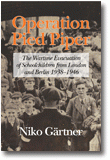
Operation Pied Piper
The Wartime Evacuation of Schoolchildren from London and Berlin 1938-46
By:
Niko Gärtner
Published 2012
When war came, the authorities in London and Berlin operated evacuation schemes that sent children into billets and camps in rural reception areas. The children’s exodus either happened orderly and followed years of planning and discussion amongst policy makers (London), or haphazardly following the sudden realization that the war would not be fought exclusively elsewhere (Berlin). As policies, the government evacuation schemes were bold, controversial and - considering their distinct political contexts - surprisingly similar; as were some of their consequences: the recipients did not accept them uncritically, the municipalities failed to evacuate the majority of children from the cities under attack, and private provision catered for a lot more children than the official schemes.
This study of the British evacuation and Third Reich Kinderlandverschickung is an original and important contribution to the existing scholarship in two ways. First, it stays in the cities (rather than leaving with the evacuees towards the already well-researched evacuation experience) in order to show the scheme’ geneses, but also to appreciate issues related to their operational conduct in the face of stray children, closed schools and rebellious parents in town. Second, the study explores the evacuation schemes in the two warring capitals in comparative perspective, thus critically analyzing how policy was developed and executed in the face of shifting and differing political contexts and acute sociological challenges. This study traces local developments through sources, from the earliest plans contemplated in London during the 1930s to the collapse of the Third Reich and delayed return of Berlin children in 1946. It covers operational aspects and explores themes of agency, citizenship, childhood, schooling and the relationship between state and individual.
The robust historical research, combined with a strong central narrative, should appeal not only to historians of education or military historians, but also to policy makers, educators, former evacuees and all readers with a private or professional interest in wartime childhoods and evacuations.
CONTENTS
The Evacuations' Origins and Environments. Plans and Preparations. Operation. The Cities Left Behind. Policy Changes. The End of the War. Comparison. Conclusions. About the Author.
REVIEWS
"Last night, I finished reading your very fine book, Operation Pied Piper. I am every bit as pleased with it as I thought that I would be. I was particularly impressed by your careful separation of "evacuation policy" and "evacuation events" and your efforts to keep your book's focus on policy. Also, as one who previously had almost no knowledge of evacuation in Berlin and other German cities, I found myself reading with added interest and wishing, as you did in your narrative, that your research might have turned up more primary references to this German experience. That you found as much as you did must be acknowledged as a clear victory of historical inquiry as well as the failure of Berlin school authorities and other agencies to destroy the paper-trail that once surely existed." O. L. Davis, Jr. The University of Texas at Austin
"Your handling of the data and your use of such well chosen visual sources was outstanding and your conclusions were fascinating. Like your book, this was a most insightful and refreshingly original treatment of an issue that has long called out for new thinking of this kind." Dr Philip Gardner University of Cambridge
"Similar to the absolute relevance of the several evacuations of schoolchildren from London to rural areas for an understanding of wartime schooling in Britain, Gaertner's very important study is essential to the continuance of efforts to portray and understand the schooling of German children during the second world war. Indeed, comparative studies with this and subsequently uncovered and analyzed information can only contribute positively to an increase in the robust understanding that wartime schooling in Europe properly deserves." O.L. Davis in Aamzon.com (Read full review)
-
Paperback978-1-61735-901-9
Price: $22.99
-
Hardcover978-1-61735-902-6
Price: $34.50
- eBook978-1-61735-903-3

- EDU037000 - EDUCATION: Research
- EDU016000 - EDUCATION: History
- HIS027100 - HISTORY: MILITARY: World War II
-
 (Re)Envisioning Social Studies Education Research
Current Epistemological and Methodological Expansions, Deconstructions, and Creations
(Re)Envisioning Social Studies Education Research
Current Epistemological and Methodological Expansions, Deconstructions, and Creations
-
 American Educational History Journal - Golden Anniversary Edition
Volume 50 Numbers 1 & 2
American Educational History Journal - Golden Anniversary Edition
Volume 50 Numbers 1 & 2
-
 Distance Learning
Volume 20 #3
Distance Learning
Volume 20 #3
-
 Distance Learning
Volume 20 #4
Distance Learning
Volume 20 #4
-
 History Education and Historical Inquiry
History Education and Historical Inquiry
-
 Qualitative Research With Diverse and Underserved Communities
Qualitative Research With Diverse and Underserved Communities
-
 Quarterly Review of Distance Education
Volume 24 #1
Quarterly Review of Distance Education
Volume 24 #1

